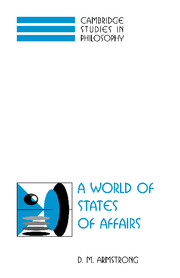Book contents
- Frontmatter
- Contents
- Preface
- 1 Introduction
- 2 Some preliminary doctrines
- 3 Properties I
- 4 Properties II
- 5 Powers and dispositions
- 6 Relations
- 7 Particulars
- 8 States of affairs
- 9 Independence
- 10 Modality
- 11 Number
- 12 Classes
- 13 Totality states of affairs
- 14 Singular causation
- 15 Laws I
- 16 Laws II
- 17 The unity of the world
- References
- Index
1 - Introduction
Published online by Cambridge University Press: 03 February 2010
- Frontmatter
- Contents
- Preface
- 1 Introduction
- 2 Some preliminary doctrines
- 3 Properties I
- 4 Properties II
- 5 Powers and dispositions
- 6 Relations
- 7 Particulars
- 8 States of affairs
- 9 Independence
- 10 Modality
- 11 Number
- 12 Classes
- 13 Totality states of affairs
- 14 Singular causation
- 15 Laws I
- 16 Laws II
- 17 The unity of the world
- References
- Index
Summary
AN OVERVIEW
The hypothesis of this work is that the world, all that there is, is a world of states of affairs. Others, Wittgenstein in particular, have said that the world is a world of facts and not a world of things. These theses are substantially the same, though differently expressed.
The general structure of states of affairs will be argued to be this. A state of affairs exists if and only if a particular (at a later point to be dubbed a thin particular) has a property or, instead, a relation holds between two or more particulars. Each state of affairs, and each constituent of each state of affairs, meaning by their constituents the particulars, properties, relations and, in the case of higher-order states of affairs, lower-order states of affairs, is a contingent existent. The properties and the relations are universals, not particulars. The relations are all external relations.
It is useful to admit molecular states of affairs. These, however, are mere conjunctions (never negations or disjunctions) of the original states of affairs. Molecular states of affairs constitute no ontological addition to their conjuncts. But in one special case, to be mentioned in a moment, they become very important.
For first-order states of affairs, that is, states of affairs that do not have states of affairs as constituents, the Tractarian thesis of Independence is somewhat speculatively, but nevertheless hopefully, advanced. No such state of affairs entails or excludes the existence of any other wholly distinct state of affairs.
- Type
- Chapter
- Information
- A World of States of Affairs , pp. 1 - 10Publisher: Cambridge University PressPrint publication year: 1997
- 1
- Cited by



